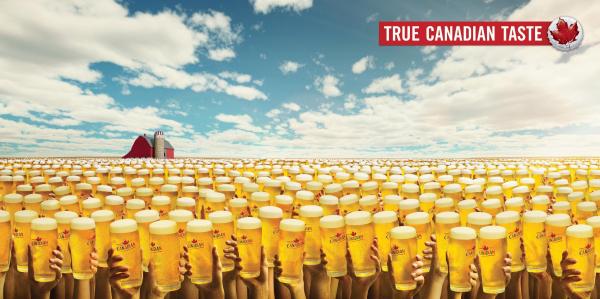Whether you’re relaxing at home with a glass of Merlot or downing a keg at a party with friends on a Saturday night, let’s face it – one of the most lucrative marketing sectors in the food and beverage industry today is alcoholic beverages. Molson Coors and its subsidiary Molson Canadian frequently advertise at large events including the Formula One race to the NHL hockey games inside arenas. Considered one of the marketing giants in Canada, Molson Canadian’s products’ images scream patriotism through mottos like “This is our land” and “made from Canada”. Molson Canadian’s most recent feat in their marketing campaign is a video uploaded called Canadian National Canthem which features a group of people playing ‘O Canada’ on Molson Canadian beer cans and bottles.
Yet this new campaign which spews subtle patriotism and their second annual Red Leaf Project to promote ‘greenness’ and environmental awareness is still a complete flip to the message that their parent manufacturer is sending to the public by advertising in men’s lifestyle magazines (e.g. Playboy and FHM). Whereas Molson Canadian thrives off of marketing towards young adults who are passionate about their country and the Canadian lifestyle by branding the beer products as leisure, everyday beverages to be consumed among an active, confident group of friends as a whole entity, Molson Coors conversely labels their products as part of a culture that seeks to commodify female sexuality, while accentuating male aplomb in targeting both genders separately.
“We’re letting [the men] know that while other beers are not doing much for their social life, we’re going to great personal expense to bring women into your love-basement grotto,” said Wright (associate creative director).
With many other brands of beer, such as Budweiser and Corona, on the market, this example of a misleading advertising claim may contribute to the superfluous topic of branding sexuality with alcohol products. In an age when ‘Gen Y’-ers or ‘Millennials’ are largely influenced by media, these incongruous marketing campaigns created by Molson Coors and its subsidiary, Molson Canada, may have a significant effect on how growing young adults view themselves – their own identity – and their respective peers as unique individuals over the consumption of these types of beverages.
Sources:
Photo credit: http://www.advertolog.com/molson/billboard/prairies-10022155/
http://www.adweek.com/news/advertising/molson-talks-separately-men-women-63551
http://www.marketingmag.ca/news/marketer-news/molson-goes-local-with-the-return-of-red-leaf-53211

Hi Amanda, great post! Really brought out the Canadian in me. 🙂 I think the alcoholic beverages industry is definitely one that is well-known for adopting sexist approaches to marketing. I found your point about how differently Molson Canadian and Molson Coors decides to market their products especially interesting. Why do you think this is? Are the Canadian and US markets really that different that Molson Coors can disregard its female customers? I always thought that American patriotism was much more prominent than Canadian, why doesn’t Molson Coors use the same patriotic appeal in its US advertising?
This is interesting post! My post was about sexism in advertising and I agree that companies are using women’s sexuality as a tool to advertise their products. You point out the specific industries like alcohol industries and I totally agree with you. Whether explicitly or implicitly, companies keep using sexuality for marketing although it’s been controversial issue for a long time. Molson Canada appears to be ethical in advertising their products by exhibiting patriotism perspective. However, Molson Canada, like other alcohol industries, uses sexism as their marketing strategy to attract customers. Is appealing sexuality in advertising the best marketing strategy? It brings up a question that there are many marketing people out there and is emphasizing sexism the only way to advertise them in a productive way?